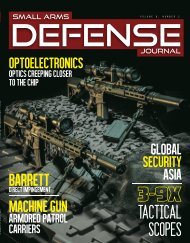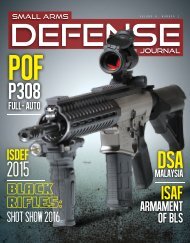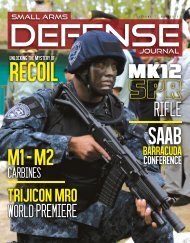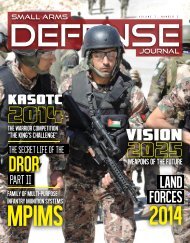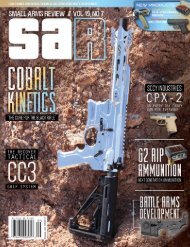SAR 20#2
You also want an ePaper? Increase the reach of your titles
YUMPU automatically turns print PDFs into web optimized ePapers that Google loves.
• the order includes a finding that<br />
the person represents a credible<br />
threat to the physical safety of<br />
the intimate partner or child OR<br />
explicitly prohibits the use, attempted<br />
use, or threatened use of<br />
physical force against an intimate<br />
partner or child.<br />
The disability is problematic because<br />
many (if not most) restraining orders<br />
meeting the requirements of the statute<br />
are never reported to NICS and are not<br />
used by the FBI as a basis for denying<br />
a firearms sale. A 1996 amendment to<br />
the Violence Against Women Act requires<br />
states to certify that its judges are<br />
required to provide notification to all domestic<br />
violence offenders of the requirements<br />
of section 922(g)(8) (and 922(g)<br />
(9), discussed below). This requirement<br />
has allowed more Federal prosecutions<br />
of violators for “knowing” violations<br />
of the GCA, but it has not resulted<br />
in more information being provided<br />
to the FBI/NICS.<br />
Section 922(g)(8) was challenged<br />
in Federal court repeatedly after enactment<br />
on the basis of the Second Amendment,<br />
due process, equal protection,<br />
and lack of notice arguments. Courts<br />
have consistently upheld the constitutionality<br />
of the statute, finding that preventing<br />
acts of domestic violence involving<br />
firearms is a reasonable restriction<br />
on firearms possession.<br />
E. Persons Convicted of a Misdemeanor<br />
Crime of Domestic Violence<br />
– 18 U.S.C. § 922(g)(9)<br />
Section 922(g)(9) of the GCA is often<br />
called “the Lautenberg Amendment,”<br />
because Senator Lautenberg of New<br />
Jersey was the sponsor of the legislation.<br />
The amendment was enacted in<br />
1996 as part of the Omnibus Consolidated<br />
Appropriations Act of 1997. This provision<br />
makes it unlawful for any person<br />
convicted of a “misdemeanor crime of<br />
domestic violence” (MCDV) to possess<br />
firearms or ammunition. The term “misdemeanor<br />
crime of domestic violence”<br />
is defined in section 921(a)(33) as an<br />
offense that—<br />
• is a misdemeanor under Federal,<br />
State, or Tribal law; and<br />
• has as an element the use or attempted<br />
use of physical force or<br />
the threatened use of a deadly<br />
weapon committed by a current or<br />
former spouse, parent, someone<br />
who has cohabited with the victim,<br />
or another individual specified in<br />
the statute.<br />
The statutory definition also provides<br />
that, even if the requirements above are<br />
established, a person is not considered<br />
convicted of a MCDV if the person was<br />
not represented by counsel and, if the<br />
person was entitled to a jury trial, he or<br />
she was tried by jury or waived the right<br />
to a jury trial. In addition, the statute has<br />
language similar to that for felony convictions<br />
providing that post-conviction<br />
events may invalidate the MCDV conviction.<br />
If the MCDV is expunged, set<br />
aside, pardoned, or the person has had<br />
civil rights restored, the MCDV will not<br />
be disabling under section 922(g)(9).<br />
ATF’s regulations implementing the<br />
statute interpret the term “misdemeanor”<br />
to include, in States which do not<br />
classify offenses as misdemeanors,<br />
offenses punishable by imprisonment<br />
for a term of one year or less and includes<br />
offenses punishable by only<br />
a fine. Thus, even if a State does not<br />
label a particular offense as a misdemeanor,<br />
it will result in Federal firearms<br />
disabilities if the offense meets the<br />
statutory definition.<br />
Many state misdemeanor statutes for<br />
simple assault and other misdemeanors<br />
that may qualify as MCDVs contain<br />
multiple subparts or clauses within the<br />
subparts only some of which contain the<br />
element of physical force. For example,<br />
assault statutes frequently provide that<br />
a person commits assault either by using<br />
physical force against the person<br />
OR by making verbal threats. Only the<br />
first qualifies as a MCDV. There is a<br />
great deal of case law on the evidence<br />
the government may use to determine<br />
whether a misdemeanor conviction<br />
qualifies as a MCDV. This is a complicated<br />
area of the law, and if you are<br />
unsure whether a particular offense<br />
is disabling, contact your local ATF<br />
office for guidance.<br />
An interesting wrinkle to the Lautenberg<br />
Amendment is that it includes<br />
language that makes this disability applicable<br />
to law enforcement officers and<br />
the military. These categories of persons<br />
are generally exempted from most of<br />
the restrictions of the Federal firearms<br />
laws because of the general government<br />
exemption in 18 U.S.C. § 925(a)<br />
(1). This results in police officers and<br />
other law enforcement officers being<br />
able to acquire firearms from FFLs in interstate<br />
commerce free of the interstate<br />
controls, Form 4473 requirements, and<br />
NICS checks required of other firearms<br />
purchasers. It also means that police<br />
officers who happen to be prohibited<br />
persons (e.g., felons, dishonorable discharges,<br />
etc.) may lawfully possess<br />
firearms and ammunition for purposes<br />
of carrying out their official duties. However,<br />
the Lautenberg Amendment added<br />
language to the GCA to carve out misdemeanor<br />
crimes of domestic violence<br />
from the general exemption. Accordingly,<br />
police officers who have been convicted<br />
of such misdemeanors may not<br />
lawfully possess firearms or ammunition<br />
for any purpose. This provision of the<br />
GCA was challenged by police organizations<br />
and individual police officers<br />
immediately after enactment and was<br />
upheld. See Fraternal Order of Police v.<br />
United States, 173 F.3d 898 (D.C. Cir.<br />
1999). The statute has also survived a<br />
variety of constitutional challenges in<br />
the Federal courts of appeal under the<br />
Sixth Amendment, Commerce Clause,<br />
Second Amendment, Due Process<br />
Clause, and ex post facto clause.<br />
As with domestic violence restraining<br />
orders, not all misdemeanor crimes<br />
of domestic violence are reported to<br />
NICS. Although states routinely report<br />
felony convictions to the FBI, few<br />
have the resources to report misdemeanor<br />
convictions. Accordingly, it is<br />
unlikely that all persons subject to this<br />
disability are prevented from acquiring<br />
firearms from FFLs.<br />
II. Conclusion<br />
The Federal firearms disabilities imposed<br />
by the GCA are numerous and<br />
complex. The overview provided in this<br />
article cannot adequately cover all the<br />
legal issues raised by the lengthy statutory<br />
and regulatory definition. FFLs<br />
and others who have questions about a<br />
particular situation, person, or disability<br />
should contact qualified counsel or ATF<br />
for guidance.<br />
About the authors –<br />
Johanna Reeves is the founding<br />
partner of the law firm Reeves & Dola,<br />
LLP in Washington, DC (www.reevesdola.com).<br />
For more than ten years<br />
she has dedicated her practice to advising<br />
and representing U.S. companies<br />
on compliance matters arising<br />
under the federal firearms laws and<br />
U.S. export controls.<br />
Teresa Ficaretta is one of the country’s<br />
foremost experts on ATF regulations<br />
under the Gun Control Act, the<br />
National Firearms Act, the Arms Export<br />
Control Act and Federal explosives<br />
laws. Before joining Reeves & Dola in<br />
2013, Teresa served as legal counsel to<br />
ATF for 26 years, followed by two years<br />
as Deputy Assistant Director in Enforcement<br />
Programs and Services. They can<br />
be reached at 202-683-4200.<br />
<strong>SAR</strong> Vol. 20, No. 2 18 MARCH 2016



